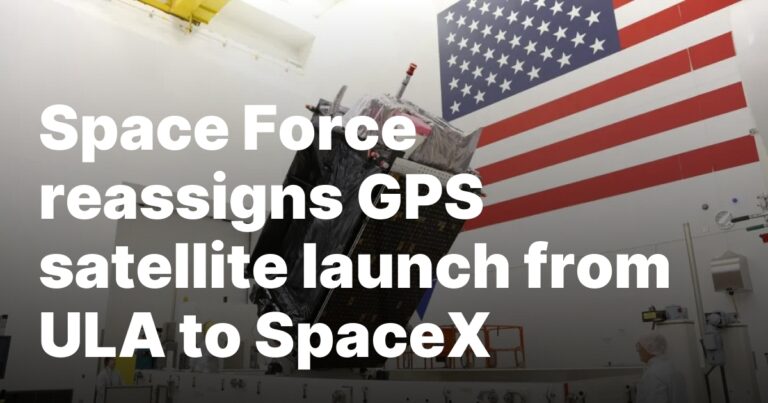COLORADO SPRINGS — The U.S. Space Force is transferring the launch of a GPS satellite from United Launch Alliance (ULA) to SpaceX in an effort to reduce a backlog of satellites waiting in storage.
The GPS III SV-08 satellite, the eighth in the GPS III constellation, is now scheduled to launch no earlier than late May aboard a SpaceX Falcon 9 rocket from Cape Canaveral Space Force Station, Florida, the Space Systems Command announced April 7.
This marks the second time in recent months that the Space Force has reassigned a GPS launch from ULA to SpaceX. Last year, the GPS III SV-07 satellite was moved from a planned ULA Vulcan rocket launch in late 2025 to a SpaceX Falcon 9, which successfully launched on December 16 in a mission called Rapid Response Trailblazer.
To maintain contract obligations with launch providers, the Space Force said a future GPS launch previously assigned to SpaceX will be given back to ULA. ULA’s Vulcan rocket, which recently received certification to fly NSSL missions, has faced development delays and has a backlog of military launches assigned under the NSSL Phase 2 contract awarded in 2020.
In a statement about the SV-08 launch, Col. Jim Horne, senior materiel leader of launch execution at the Space Systems Command, said this launch “executes a launch vehicle trade of the GPS III-7 mission from Vulcan to a Falcon 9 rocket, and swaps a later GPS IIIF-1 mission from Falcon Heavy to Vulcan, showcasing our ability to launch in three months, compared to the typical 24 months.”
Faster launch planning timeline
Officials characterized the previous reassignment as a demonstration of the Space Force’s ability to accelerate launch timelines under the National Security Space Launch (NSSL) program, which handles high-value military and intelligence satellites. The goal is to prove that planning cycles typically requiring two years can be compressed to just a few months.
For both the SV-07 and upcoming SV-08 missions, the Space Force and satellite manufacturer Lockheed Martin had to modify the payload interface—the hardware connecting the spacecraft to the rocket—to make it compatible with SpaceX’s Falcon 9 instead of ULA’s Vulcan.
“The accelerated mission involves a complex integration of effort across multiple Space Force organizations to retrieve a Global Positioning System (GPS) III satellite from storage, expedite integration with a launch vehicle, and prepare it for launch on an accelerated timeline,” the Space Systems Command said.
Lockheed Martin announced April 7 that the SV-08 spacecraft, which has been ready for launch since 2021, was delivered to Florida on a U.S. Air Force C-17 Globemaster III on April 2, where it will undergo final processing before launch.
The GPS III satellites represent the newest generation of the U.S. global positioning system, offering enhanced accuracy, improved anti-jamming capabilities, and increased interoperability with international satellite navigation systems.

